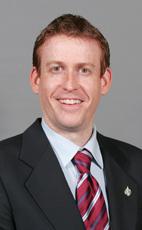Mr. Speaker, before statements by members and oral questions, we were discussing and debating this important question, the definition of marriage.
I was discussing the need to find a compromise position, a position that rejects the heavy-handed manner in which the Liberal Party has approached this issue and a position that rejects the dogmatic anti-democratic manner of the leader of the NDP, who will not even allow his own members to vote their conscience or to vote according to the will of their constituents on this issue.
It is incumbent on us in Parliament to find a compromise position and balance the interests of Canadians.
The courts have been ruling on this issue for a number of years. Following several provincial rulings on the definition of marriage, the Liberal government drafted legislation that would allow same sex marriages. However, instead of allowing the House of Commons to vote on the legislation, the Liberals referred it to the Supreme Court of Canada.
Fortunately for us and for Canadians, the Supreme Court indicated that it was up to Parliament to define what marriage means.
Without a doubt, marriage must be defined in the future as it has always been defined, as the union between a man and a woman, but that does not preclude the protection of equal rights for same sex couples and the recognition of same sex relationships.
In December, the Leader of the Opposition articulated a position which achieves the balance that Canadians and the people of Palliser have been looking for. The Conservative Party position, first, retains the traditional definition of marriage, second, ensures that same sex couples are afforded equal rights and benefits, and third, includes substantive provisions to protect religious organizations and religious freedoms.
This is a position that expresses the will of Canadians and is consistent with the Charter of Rights and Freedoms. The Conservative Party's position also balances the needs of same sex couples with the rights of religious organizations who hold a traditional view of marriage.
Not only is this moderate and thoughtful position on such an important issue consistent with the will of the majority of Canadians, it is consistent with the solution favoured by most countries that have engaged in similar debate on this issue.
Registered domestic partnerships are available in Sweden, Spain, Norway, Denmark, Finland, Germany, Iceland and parts of Italy. Civil pacts are available in France. Other countries are considering introducing legislation to provide protections, rights and benefits to individuals in committed same sex relationships.
This is an important point. Canadians are not the only ones who are hesitant about altering the definition of marriage. This is a position held by millions around the world who agree not only on the definition of marriage but on the importance of traditional marriage to society.
There is also a consensus in the countries I mentioned earlier that we need to recognize the status and legal rights of same sex couples.
As speakers before me have noted, the question is not about rights or equality. It is about marriage and whether Canadians want to change the definition of marriage. It is about how Canadians want to recognize committed same sex relationships. That is the choice before Parliament.
The position of the Conservative Party is that we should recognize same sex committed relationships as civil unions while continuing to retain the traditional definition of marriage. As I have stated before, this is also the position of the vast majority of my constituents in Palliser.
In closing, I would urge the members here today to listen to the will of their constituents. Not only are Canadians looking for clear thinking and a middle ground on this contentious issue, they are looking for leadership. Most of all, they want their voices to be heard.
I am proud to say that I have listened to the people in my riding of Palliser and represented their wishes on this important issue. I am proud to be a member of a political party that is willing to allow its members to vote freely on this issue so that the voices of their constituents can be heard.

